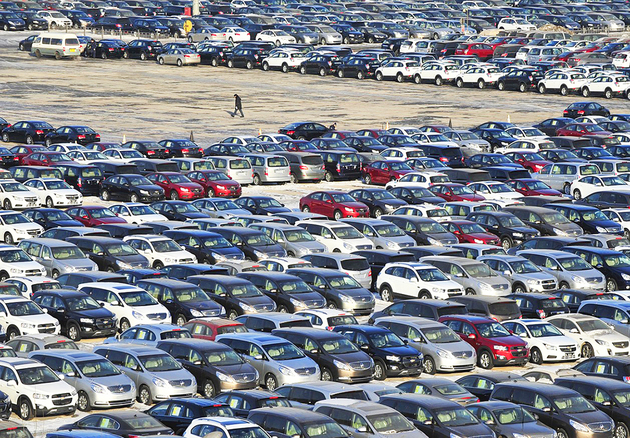
Photo/VCG
China's used car sector is set to gather momentum and grow on the back of new rules that allow cross-region movement of such vehicles for the purpose of sales.
The rules were introduced during the ongoing session of the 13th National People's Congress.
Luo Lei, deputy secretary-general of the China Automobile Dealers Association, said the central government's decision to lift limits on flow of used vehicles across regions will boost their sales and circulation.
"It will encourage consumers to switch cars more frequently and help enterprises to better position themselves to explore the untapped demand," Luo said.
The remarks came after the Government Work Report 2018 said earlier this month that more efforts will be made this year to scrap any limits on cross-region flow of used cars, as part of the country's broader push to make the automobile industry globally competitive.
Li Jian, CEO of Renrenche, a major used car dealer in China, said: "It is super arriving. The spring is finally coming. The move will make great use of existing car resources and offer a strong impetus for us."
Currently, China has about 217 million cars on the road, official data show. About 78 percent of them are owned by residents in first- and second-tier cities. But demand for used vehicles chiefly comes from consumers in small cities, resulting in huge demand-supply imbalances geographically, according to data from Youxin, another online used car dealer.
"We'll expand our presence in the sector to better meet consumers' growing demand. The (new) policy gives us more confidence," Li of Renrenche said.
The company has more than 100,000 used cars on sale on its platform, with services available in more than 100 cities.
Agreed Wang Xin, chief marketing officer of Youxin. "Thanks to the cross-region sales, sellers now have more customers, so rising demand could boost prices. Buyers would benefit by way of broader choice, which could also set the right price for each model."
In 2017, 12 million used cars were sold across China, up 19 percent year-on-year, the latest data from the China Auto Dealers Association showed. Overall sales hit 809.2 billion yuan (128 billion U.S. dollars) last year, marking a stellar growth of 34 percent.
Yu Mu, senior analyst from Beijing-based internet consultancy Analysys, said in China, new supportive policies can result in a boom.
China's used car sales are expected to hit 20 million vehicles in 2020, double the 2016 level, according to a forecast by consultancy PricewaterhouseCoopers.
New players have marched into the sector. Didi Chuxing, China's largest ride-hailing company, has invested 200 million U.S. dollars in Renrenche in September 2017.
Didi, which already has over 21 million drivers on its platform, will buy used cars as well as new vehicles directly from Renrenche, to help lower costs for aspiring part-time drivers. The transaction volume between the two sides is likely to exceed 2 million vehicles in three years, Renrenche said in a statement.
"Sales on account of Didi could account for 15 to 20 percent of our overall sales this year," Li of Renrenche said.
This will likely intensify competition in the used cars segment. CARS, the arch rival of Renrenche, announced earlier this month that it has raised 818 million U.S. dollars in its latest round of financing, which was led by internet heavyweight Tencent Holdings Ltd. Interestingly, Tencent is also an investor in Renrenche.
"The market is huge and can house multiple players. I don't worry about Tencent's investment in CARS. Instead, Tencent's increasing presence in the industry shows secondhand cars are highly promising," Li said.
Used cars business was mentioned in the latest Government Work Report, an annual document that details China's most important agenda for the year.
Ma Miao, a bank employee at Yiyang, a small city in Hunan province, said: "The Government Work Report this year gives me a good suggestion. I can buy a quality used vehicle now at a much lower price than that of a new one."
Email: lansuying@nbd.com.cn


 川公网安备 51019002001991号
川公网安备 51019002001991号





